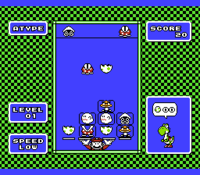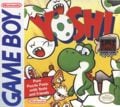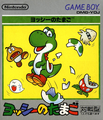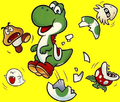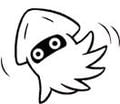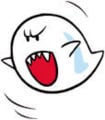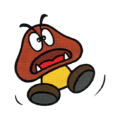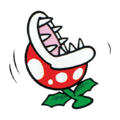Yoshi (game)
Template:Articleabout Template:Infobox Yoshi, known in Europe as Mario & Yoshi and in Japan as Yoshi no Tamago (ヨッシーのたまご, lit. "Yoshi's Egg"), is a puzzle game featuring the title character. In this game, enemies from past Mario games fall and the player must get two of the same enemy to stack on top of one another. If the enemies are the same, they'll disappear. If they're different, they'll just stay where they are. If too many stack up, the player loses the game. The concept of the game was inspired by Tetris.
The NES version of this game is available on the Wii's, Nintendo 3DS's, and Wii U's Virtual Console.
Game modes
1-Player Mode
In this mode, only one player who controls Mario plays the game. There are two "types" of game to play, the A Type, and B Type. Before each game, the player sets the type of game, level of difficulty, speed of falling enemies, and in-game music for the game ahead. A board is made out of four "plates" which enemies fall onto. Mario uses left and right on the D-Pad to move about, and the /
/
![]() /
/![]() /
/ and
/
/
![]() /
/![]() /
/ Buttons to make two plates switch places.
A-Type
Mario must match the enemy icons to earn points and, hopefully, make a high score. Any two enemies placed together vertically make a match, earning Mario five points. A very handy way of clearing excess enemies from the board are egg halves. There are two halves that stack together to make a full egg, thus hatching a baby Yoshi and getting fifty points for Mario. When a top half is placed by itself on the board, it will dissipate. But if a bottom piece is placed, there it will stay until another falls on top of it for an ordinary match, or a top piece stacks onto it.
A handy little tip is that no matter how many enemies are on top of the bottom egg piece, if the top piece is placed on the same stack as the bottom, it will plow through the entire stack until it reaches its other half. This is also a big point boost, as any enemy inside the stack equals fifty points! It will also result in a larger Yoshi hatching from the egg. The levels of Yoshis are as follows:
- Small Yoshi: No enemies in the egg.
- Tall Yoshi: One to four enemies in the egg.
- Winged Yoshi: Five or six enemies in the egg.
- Star Yoshi: Seven enemies in the egg.
As the game progresses, more and more enemies come down, faster and faster. The game never ends, though. The only point is to make a high score.
B-Type
Exactly like the A-Type, but now games are timed. When the board is completed, not only is the score recorded, but also the amount of time spent on that game.
2-Player Mode
Before a player face-off, each one picks their own level and speed. The game plays just the same, but the board is now split in half, right half for Player 1, Mario, left half for Player 2, Luigi. If a player loses, he gains an "X", while the winning player (whoever was still alive when his opponent lost) gains an "O". An "X" simply signifies a lost game, and "O", one won. Won games are recorded on the upper part of each player board by Yoshi eggs. If a player has three eggs, he wins.
Characters
- Mario (Playable)
- Luigi (Playable)
- Yoshi
- Baby Yoshi
- Goomba
- Blooper
- Boo
- Piranha Plant
Appearances in other media
Yoshi was the subject of a manga called Yoshi's Egg by Kazuki Motoyama, who later went on to write a manga based on Super Mario World 2: Yoshi's Island. It involves Yoshi opening a restaurant called Yossy's Pizza (note that the Yossy in the name was how Yoshi's name was anglicized in Japan at the time).
Reception
The game received mixed to negative reviews due to the repetitive gameplay and the fact that it is based on luck. Brett Alan Weiss of Allgame said that Yoshi was a "surprisingly dull game" and he noted that the controls were unique, but he also added; "the novelty wears off after a while."
The Virtual Console re-release also received negative reviews. GameSpot's Frank Provo and IGN's Lucas M. Thomas gave the game 5 of 10 stars. Thomas said the game was "slow" and the controls were "cumbersome".
Several video game websites said that players should refrain from buying Yoshi on the Wii Shop Channel. Nintendo World Report said that "there was too much luck and chance in the game to make playing it satisfying". Joystiq said that "while [the gameplay is] admittedly a pretty interesting way to spend an afternoon, it still feels kind of a ripoff."
1UP.com's Jeremy Parish stated that the gameplay was "not enough to justify the asking price of [of 500 points]", but he later stated that, compared to Yoshi's Cookie, it was "decent and actually had some relationship to the Mario series."
N-Force gave the game a positive review saying that in a preview for the game that it was "basically the game is great. The fun of Tetris, but with colour and sound effects. Just as hard, maybe harder - definitely just as addictive." They later rated the game 4/5 stars in the Buyer's Guide for the Jan. 1993 issue saying that "Yoshi is great fun. Gameplay's nothing new - Tetris all over again! Graphics are a treat. Lots of fun - in short bursts."
Despite the negative reviews, the game sold well and helped Game Freak create the Game Boy Pokemon games.
References to other games
- Super Mario Bros. 3: Mario's sprite from this game appears on the high score board. All of the enemies look identical to their sprites from Super Mario Bros. 3 (with the exception of Piranha Plants)
- Super Mario World: Yoshi's many forms and the Piranha Plants' design are from this game.
Gallery
Box arts and logos
Artwork
Names in other languages
References
Template:BoxTop Template:Yoshi series
| Game Boy games | |
|---|---|
| Super Mario franchise | Alleyway (1989) • Baseball (1989) • Super Mario Land (1989) • Golf (1989) • Dr. Mario (1990) • Super Mario Land 2: 6 Golden Coins (1992) • Donkey Kong (1994) • Mario's Picross (1995) • Picross 2 (1996) |
| Donkey Kong franchise | Donkey Kong (1994) • Donkey Kong Land (1995) • Donkey Kong Land 2 (1996) • Donkey Kong Land III (1997) |
| Yoshi franchise | Yoshi (1991) • Yoshi's Cookie (1992) • Tetris Attack (1996) |
| Wario franchise | Wario Land: Super Mario Land 3 (1994) • Wario Blast: Featuring Bomberman! (1994) • Wario Land II (1998) |
| Miscellaneous | Tetris (1989) • The Legend of Zelda: Link's Awakening (1993) • Game & Watch Gallery (1997) • Game & Watch Gallery 2 (1997) |
